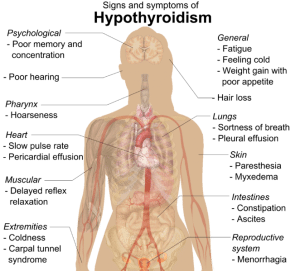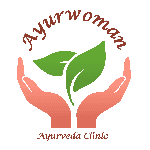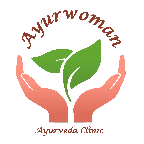Hypothyroidism Ayurveda treatment
Hypothyroidism treatment in Ayurveda starts with a body analysis of the patient. This gives the practitioner an idea of dosha combinations involved in each specific situation.

Hypothyroidism is a common endocrine disorder caused by an under-active thyroid gland. Thyroid gland is located in the lower part of the neck below adam’s apple. It produces a hormone which regulates body metabolism.
An under-active thyroid gland produces less than normal amount of thyroid hormone and slows down body metabolism rate. This could result in a number of symptoms such as exhaustion, poor ability to tolerate cold, weight gain etc.
An over active thyroid gland results in an increase in metabolic rate and is termed hyperthyroidism.
Under-active thyroid symptoms
Following are some of the well known symptoms of hypothyroidism:
- fatigue
- muscular aches and pains
- weight gain
- intolerance to cold
- gaseous distention
- husky, hoarseness or slowness of voice
- constipation
- anaemia
- slow pulse rate
- brain fog and memory problems
- elevation in blood pressure
- dry skin
- coarse brittle dull hair
- hair loss
- vertigo
- lethargy
- menstrual irregularities
- infertility
- reduced libido
- anorexia
- changes in the facial appearance especially puffiness
- tightness and swelling of neck
Thyroid disease (hypothyroidism or hyperthyroidism) are a common disorder and they often runs in families. It can be associated with diabetes, rheumatoid arthritis or pernicious anemia. It is more common in women than in men. In women of child bearing age menstrual disturbances including pre-menstrual syndrome (PMS) may occasionally be due to an under-active thyroid gland.
Aetiology
- Antibodies acting against the thyroid gland destroying thyroid tissues are a common cause of an under-active thyroid
- An overactive nodule in the thyroid
- Low thyroid stimulating hormone (TSH)
- A viral infection
- Radiation treatment for over active thyroid
- Excessive use of adulterated and goitrogenic food ( cabbage, cauliflower, peanuts, cassava, kale, sweet potato )
- Selenium deficiency
- Exposure to pesticides and heavy metals
- Constant stress
- Hereditary defects in thyroid iodide transport, thyroglobulin and hormone synthesis
Hypothyroidism treatment plan
According to Ayurveda literature, impairment of vayu, kapha and meda lead to the enlargement of the thyroid gland.
Ayurveda literature does not describe pathogenesis of thyroid dysfunctions explicitly. Most available literature relate hypothyroidism as caused by excess of kapha and meda. When the above factors get aggravated and become out of balance, they produce hormonal imbalance. This hormonal imbalance triggers a slow process of enlargement of thyroid gland.
Hypothyroidism is a very slow process. Initial signs may be lack of appetite, loss of taste for food and recurrent infection due to loss of immunity.
To decide on a hypothyroidism treatment regime, it is essential to classify the disorder based on the doshas combinations at play.
Hypothyroidism symptoms caused by aggravated Kapha dosha
- Increased body weight
- Myxoedema
- Sensitivity to cold
- Physical and mental sluggishness
- Forgetfulness
- Increased cholesterol level
- Reduced sweating or absence of sweating
Hypothyroidism symptoms caused by increased medho dhatu
- Enlarged thyroid
- Most of the above mentioned kapha dosha symptoms
Hypothyroidism symptoms caused by imbalance of vata dosha
- Dry hair, skin and brittle nail
- Constipation
- Irregular heart beat
- Muscle aches and pain
- Irregular and / or painful periods
Hypothyroidism symptoms caused by increased Tamoguna
- General Lethargy
- Reduced mental activities
- Depression
Hypothyroidism treatment
In ayurveda, hypothyroidism treatment starts with a body analysis. This will give the practitioner an understanding of dosha imbalances involved. Treatments are individually customised based on doshas involved.
While full body massage such as udwarthanam and full body dhara such as dhanyamladhara help in managing vata and kapha imbalance, therapies such as virechanam and vasthi are also appropriate at the right stage and phase of the treatment. Ayurveda treatments and therapies are supported by ayurvedic medicines such as varuna, punarnava, guggulu, kanchanara, sigru etc which are used in a variety of forms and preparations.
Yoga and hypothyroidism treatment
Long term stress can alter thyroid functions. Increased stress levels will increase cortisol level which in supresses thyroid production. So, handling stress in any possible way is a good step in hypothyroidism treatment. Yoga is beneficial in reducing stress levels and will also calm the nervous system. Yoga therapy is very useful in balancing endocrine functions.
Sarvangasana or shoulder stand is well documented as a yoga posture beneficial for thyroid problems. This is an upside down posture. Due to the gravity effect more fresh blood is pumped into the neck and shoulder area which nourishes. heals and balances thyroid glands.
Another well regarded yoga routine is Simhasana or Lion posture.
The above mentioned yoga postures together with thyroid reflex point massage help in a normal and healthy thyroid function.
Regular exercises
Regular exercising such as swimming, walking and any type of cardio exercise improve circulation and metabolism. It is ideal to plan an exercise schedule based on recommendations from your ayurveda practitioner.
Hypothyroidism diet
A proper diet is essential in supporting rest of hypothyroidism treatment routine. Your ayurveda practitioner will give you a customised diet chart. This will be dos and donts of everyday foods to go with the pace of your treatment.
The following dos and donts should be treated only as an indicative diet recommendation.
- Include or increase food which have opposite qualities of Kapha dosha such as:
- food that are light
- spicy foods
- pungent foods
- dry foods
- Include or increase foods and supplements which are rich in calcium, magnesium, iodine, iron, zinc and selenium. This will help in balancing immune functions. These supplements also increase bone density. ( This is a likely scenario as the bones are prone to get recurrent infections and osteoporosis.)
- Avoid goitrogenic food such as Brassica family of foods. Avoid broccoli, cauliflower, kale and cabbage and brussel sprouts.
- Avoid or reduce potato and cassava.
- Reduce consumption of coleslaw, peanuts, radish and soy milk.

